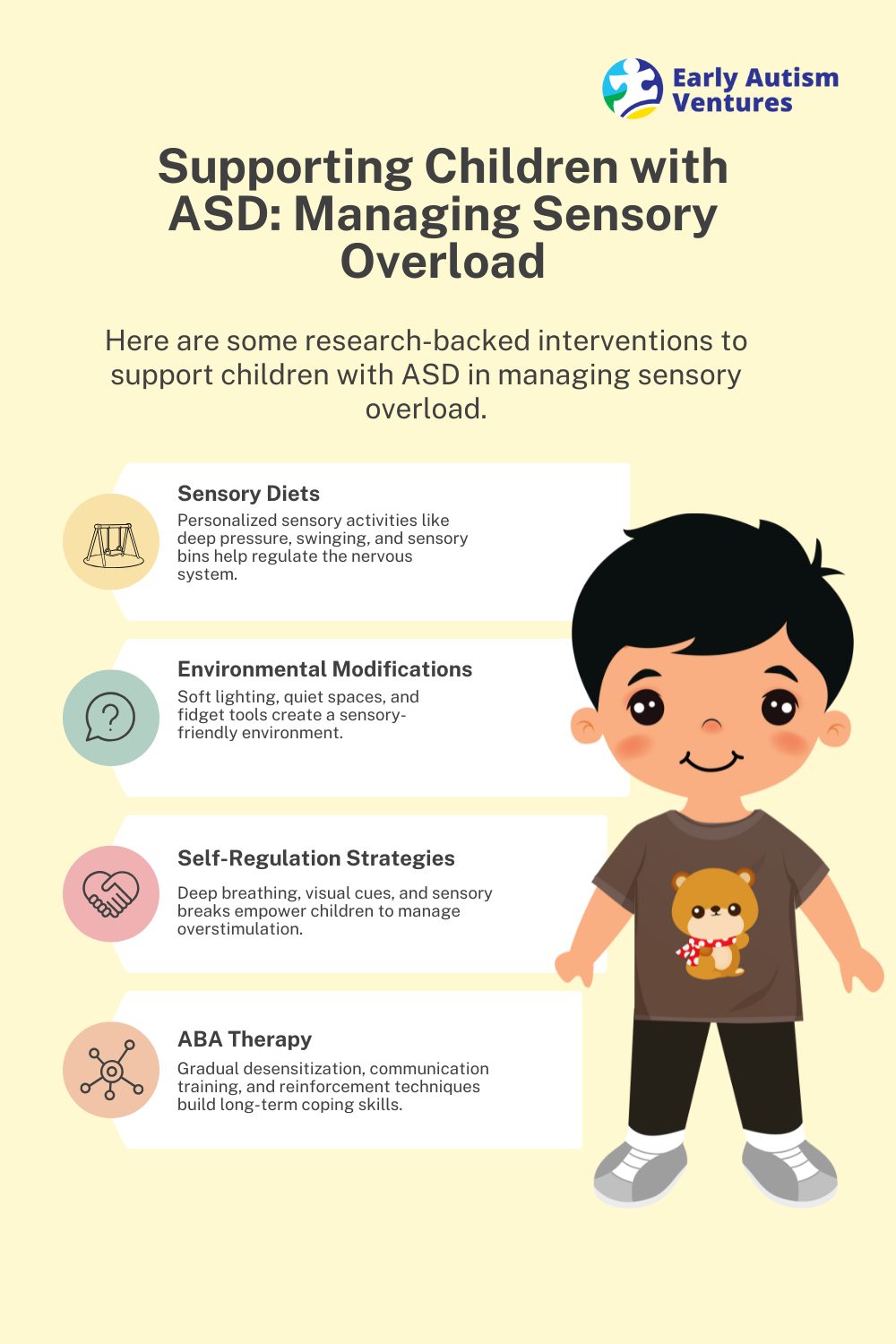
Imagine walking into a brightly lit shopping mall. The overhead lights flicker, the crowd buzzes like a swarm of bees, and the smells from the food court hit you all at once.
Now, amplify that feeling tenfold—that’s what sensory overload can feel like for a child with autism spectrum disorder (ASD).
For many children with autism, the world can be a disruptive combination of overwhelming sensations—some too loud, some too bright, some too rough, and some too unpredictable.
Sensory processing differences are a hallmark of ASD, often making everyday experiences challenging.
But here’s the good news: with evidence-based strategies, we can help children navigate sensory overload, making their world feel more manageable and even enjoyable.
In this blog, we’ll explore sensory overload in autism, effective ways to address it, and how Applied Behavior Analysis (ABA) can play a crucial role in helping children develop coping mechanisms.
If you’ve ever felt lost about how to support your child through sensory challenges, this guide is for you!
What is Sensory Overload in Autism?
Sensory overload occurs when one or more of the body’s senses are bombarded with too much information, making it hard for the brain to process and respond appropriately.
Children with autism often experience heightened or diminished responses to sensory input, which can lead to anxiety, meltdowns, or withdrawal.
Common sensory sensitivities in autism include:
- Auditory Sensitivities – Loud noises like sirens, vacuum cleaners, or even a ticking clock can feel unbearable.
- Visual Sensitivities – Bright lights, fast-moving objects, or certain colors can be overstimulating.
- Tactile Sensitivities – Tags on clothing, different fabric textures, or unexpected touches might feel uncomfortable or even painful.
- Olfactory & Gustatory Sensitivities – Strong smells or food textures can lead to extreme discomfort or food aversions.
- Vestibular & Proprioceptive Differences – Some children seek movement constantly (rocking, spinning, jumping), while others might struggle with balance and coordination.
Understanding your child’s unique sensory profile is the first step to helping them navigate the world with greater ease.
Evidence-Based Approaches to Address Sensory Overload
The great thing about sensory challenges? There are proven strategies that help.
Here are some research-backed interventions to support children with ASD in managing sensory overload.
- Sensory Diets: Feeding the Nervous System What It Needs
Well, a sensory diet isn’t about food. A sensory diet is a personalized plan of sensory activities designed to meet a child’s sensory needs throughout the day. Think of it as a workout routine for the nervous system. These activities may include:
- Deep pressure (weighted blankets, tight hugs)
- Swinging or rocking (helps regulate vestibular input)
- Sensory bins (rice, beans, or kinetic sand for tactile stimulation)
- Noise-canceling headphones (reducing auditory overload)
When implemented consistently, sensory diets can help children self-regulate and reduce anxiety in overwhelming situations.
- Environmental Modifications: Creating a Sensory-Safe Space
Wouldn’t it be nice if the world came with a “sensory-friendly” setting?
While we can’t always control external environments, we can modify a child’s personal space to make it more comfortable. Some effective adjustments include:
- Soft lighting instead of harsh fluorescents
- Visual schedules to reduce anxiety about transitions
- Fidget tools for focus and self-regulation
- Designated quiet spaces for breaks during overwhelming moments
The goal is to create predictability, which can be incredibly calming for children with ASD.
- Teaching Self-Regulation Strategies: Empowering Kids to Cope
Children with autism may not always recognize when they’re becoming overstimulated. Teaching them self-regulation techniques can empower them to take control and help shape positive behaviors. Some effective strategies include:
- Deep breathing exercises – A simple “smell the flowers, blow out the candles” technique can help.
- Visual cues – A color-coded emotional chart helps children express how they feel.
- Sensory breaks – Taking a break before reaching a meltdown prevents escalation.
Encouraging children to recognize their own sensory triggers is a powerful step toward self-management.
- Applied Behavior Analysis (ABA): Building Long-Term Coping Skills
Now, let’s talk about the gold standard in autism therapy—Applied Behavior Analysis (ABA). ABA is not just about teaching skills; it’s also highly effective in helping children cope with sensory overload.
How does ABA help with sensory challenges?
- Desensitization Techniques – Gradual exposure to sensory stimuli in a controlled way can reduce hypersensitivity over time.
- Functional Communication Training (FCT) – Teaching children to use words, signs, or pictures to express discomfort instead of resorting to meltdowns.
- Reinforcement Strategies – Rewarding positive coping behaviors to encourage self-regulation.
- Customized Learning – ABA therapists tailor interventions to the child’s specific sensory needs, ensuring maximum effectiveness.
Many parents who’ve tried ABA therapy report fewer meltdowns, better emotional regulation, and greater independence in their children.
How Early Autism Ventures (EAV) Can Help Your Child
At Early Autism Ventures (EAV), we understand the complexities of sensory overload and autism.
Our expert ABA therapists work one-on-one with children, designing personalized plans to address sensory sensitivities and improve self-regulation. Read more about our in-center ABA therapy services here.
At EAV, we are dedicated to helping every child thrive by offering individualized ABA therapy tailored to their unique needs. Our compassionate approach incorporates sensory-friendly strategies designed to help children navigate daily challenges with confidence.
We understand that parenting a child with sensory or behavioral needs can feel overwhelming, which is why we provide comprehensive parent coaching and support, empowering you every step of the way.
Our proven methods have helped countless children reduce sensory-related behaviors, improve emotional regulation, and enhance their communication skills, fostering meaningful growth. At EAV, we believe that every child deserves the opportunity to flourish in their environment—and we’re here to make that possible.
Let’s Take the First Step Together
You don’t have to navigate this journey alone. If sensory overload is making daily life difficult for your child, Early Autism Ventures is here to help.
Contact us today for a free consultation, and let’s create a plan that empowers your child to succeed.
Every moment counts in your child’s development. Reach out now—let’s turn challenges into breakthroughs together.






Recent Comments